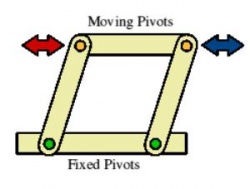Parallel Motion Linkage: Difference between revisions
From DT Online
(Created Parallel Motion Linkage) |
(Added link) |
||
| Line 1: | Line 1: | ||
[[File:MechanismsParallelMotionLinkage.jpg|250px|right]] | [[File:MechanismsParallelMotionLinkage.jpg|250px|right]] | ||
The '''Parallel Motion Linkage''' is a special case of | The '''Parallel Motion Linkage''' is a special case of '''[[Four Bar Chain]]''' in which the equal in lengths of opposite sides of the parallelogram ensure that input and output motions remain parallel. | ||
Revision as of 20:05, 10 February 2015
The Parallel Motion Linkage is a special case of Four Bar Chain in which the equal in lengths of opposite sides of the parallelogram ensure that input and output motions remain parallel.
There are several good examples of these in action. The Pantograph is a parallel motion linkage used by electric trains to pick up power from overhead cables. Another use is the Pantograph used in drawing to copy sketches. Other uses are in containers such as tool boxes and sewing boxes which open up to reveal multiple shelves and containers which need to be held horizontal.
Template:Secondary Mechanisms
Template:Primary Mechanisms
